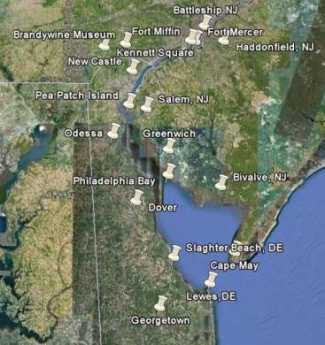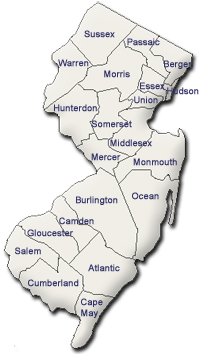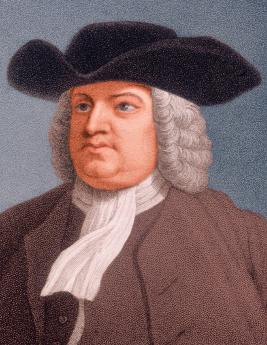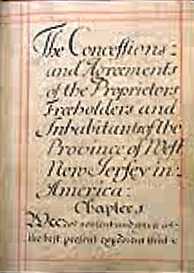Related Topics
Delaware (State of)
 Originally the "lower counties" of Pennsylvania, and thus one of three Quaker colonies founded by William Penn, Delaware has developed its own set of traditions and history.
Originally the "lower counties" of Pennsylvania, and thus one of three Quaker colonies founded by William Penn, Delaware has developed its own set of traditions and history.
Quakers: William Penn
Although Ben Franklin gets more ink lately, William Penn deserves at least equal rank among the most remarkable men who ever lived.
Particular Sights to See:Center City
Taxi drivers tell tourists that Center City is a "shining city on a hill". During the Industrial Era, the city almost urbanized out to the county line, and then retreated. Right now, the urban center is surrounded by a semi-deserted ring of former factories.
Land Tour Around Delaware Bay
 Start in Philadelphia, take two days to tour around Delaware Bay. Down the New Jersey side to Cape May, ferry over to Lewes, tour up to Dover and New Castle, visit Winterthur, Longwood Gardens, Brandywine Battlefield and art museum, then back to Philadelphia. Try it!
Start in Philadelphia, take two days to tour around Delaware Bay. Down the New Jersey side to Cape May, ferry over to Lewes, tour up to Dover and New Castle, visit Winterthur, Longwood Gardens, Brandywine Battlefield and art museum, then back to Philadelphia. Try it!
New Jersey (State of)
 The Garden State really has two different states of mind. The motto is Liberty and Prosperity.
The Garden State really has two different states of mind. The motto is Liberty and Prosperity.
Revisionist Themes
In taking a comprehensive view of a city, an author sometimes makes observations which differ from the common view. Usually with special pride, sometimes a little sullen.
The Proprietorships of William Penn
William Penn became first interested in the Colonies when he acquired New Jersey as an investor in what started out as the bankruptcy proceedings of a client. Unlike his spoiled children and grandchildren, he was sincerely interested in helping the persecuted members of his new religion, and those who later totaled up his lifetime finances found that overall he lost money on his real estate ventures. His descendants, however, were mainly concerned with selling real estate, and soon reverted to Anglican church membership. When William Penn later received Pennsylvania and Delaware from the King of England (Charles II, the Stuart King restored with the help of his Admiral father), he not only owned these territories but for practical administrative reasons was offered the right to rule them. By then Penn's main future intention was to found a refuge for Quakers and other religious dissenters, so becoming a vassal King was graciously declined. Instead, he became a real estate Proprietor, after satisfying himself about the government and other arrangements in only a general way. At least half the original 13 colonies were also proprietorships, although the terms of their grants had great variation. Penn's intention for the proprietorship was to sell off as much of the property as possible, sort of benignly watching the process unfold in the parts he had sold.
There were two unforeseen flaws in this benevolent idea; the first was that his sons and heirs would abandon the Quaker faith and have little interest in his holy experiment except for the revenue it returned. The second flaw was to fail to see that vigorous religious toleration might eventually lead to the Quakers becoming outnumbered in their own refuge. Eventually, there does come a time in the real estate sell-off process when you have sold more than you retain. After that point, you may no longer dominate the politics, and in fact, that happened far sooner than half-way, because of Penn's unwillingness to employ force .

|
| William Penn |
In land value, although perhaps not in land area, that point of loss of control had been reached by the middle of the eighteenth century, and it led to a famous battle between the Penn descendants and Benjamin Franklin. The Penn family saw no justice in paying taxes on the land they hadn't yet sold, or obeying laws created by their customers which extended beyond the land they owned; if they wanted to rule it all, they should buy it all. Franklin took the part of the settlers and immigrants, who resented paying taxes and fighting Indians on behalf of someone who still owned vast stretches of the land "within" the colony. A significant factor in this peculiar argument is that Thomas Penn, the dominant chief of the family descendants, had a deep and abiding suspicion of Franklin, dating back to that episode related in Franklin's Autobiography where Franklin raised a militia in King George's War when the pacifist Quakers refused to do so. Both sides had some justice in their positions, both sides appealed to the King. The Penns knew the King better, so Franklin lost. That was mostly what Franklin was doing in London in the years before the Revolution, and eventually, it took a Revolutionary war to resolve the issue. Some have said the episode showed Franklin was not as shrewd a politician as history books would portray him. In fact, it more likely emphasizes that Franklin was a loyal British subject right up to 1775. His position was that all parties were and forever would be, inhabitants of the British Empire, so they had equality under British rule. The Penns felt they had a right to consider Pennsylvania their own sovereign property, under which the colonists had no rights until they paid for them. It is easy to see how the notion of independence could take hold in this curious reversal of roles. Nevertheless, Pennsylvania did resolve the issue with the appearance of lawfulness, although with restrained generosity. To quote Sydney G. Fisher, writing in The Quaker Colonies, "When the people could have confiscated everything in Pennsylvania belonging to the proprietary family, they not only left them in possession of a large part of their land but paid them handsomely for the part that was taken." The matter is generally considered to have been finally settled by the Confirming Act of 1787, although few would now contend that fifteen pennies per acre is or was a handsome price.
And so, the Pennsylvania proprietorship was dissolved. In New Jersey, on the other hand, the proprietorship still exists. The land between the North River (Hudson) and the South River (Delaware) was divided into two proprietorships by a line drawn between the Delaware Water Gap, and Beach Haven on Long Beach Island. The southern segment was called the Proprietorship of West Jersey, informally peopled by English Quakers, and a northern half, the Proprietorship of East Jersey, informally ceded to Scots Quakers who proved to be more Scottish than Quaker. Temperamental differences might well have eventually led the two segments to take opposite sides of the 1860 Civil War except that it was the northern half that sympathized with slavery and the Southern Confederacy, while the Proprietorship of West Jersey was mostly where the anti-slavery movement began, with a Quaker named John Woolman. As matters turned out, neither slavery nor taxing unsold land became irreconcilable issues in the Jerseys. Unsold land of the Proprietorship was already fairly minor in New Jersey at the time of the Revolution, but the issue hadn't been forgotten by the Proprietors, either. A couple of the stockholders of the proprietorship were members of the Constitutional Convention. When the time came that other delegates urgently needed New Jersey's vote to ratify the new constitution, the Proprietor problem was "explained" to the other states. The outcome was that the proprietorship tacitly agreed to be taxed and regulated like any other property owner, while their own rights were respected as persisting under the new Constitution. Such a sensible outcome was probably not possible in Pennsylvania because there was so much more unsold land to fight about. The peacefully accepted consequence in New Jersey, even today, is that when the ocean creates a new strip of beach or a farmer abandons some land on the other side of a turnpike, it reverts to the Proprietorship as undeeded and untitled land. As such, it legally belongs to a little group of stockholders who meet once a year in Burlington or Salem, under a tree, and who can actually pay themselves annual dividends. It is however only true in half the state; the Proprietorship of East Jersey surrendered its rights to the State in 1998.
In Delaware, things are a little fuzzier. Delaware was once part of Pennsylvania, as its lower three counties. John Dickinson was once Governor of both states, but they had two legislatures from 1700 to 1776. The last time the proprietorship matter came up, so far as real estate lawyers can remember, was in the shifting sandy beaches of Cape Henlopen; things were smoothed out by making the disputed land into a state park.
REFERENCES
| Encyclopedia of New Jersey | Google Books |
| The Problem of West Jersey | JSTOR |
| The Oxford History of the British Empire: The Origins of the Empire | Google Books |
| A Map of East and West New Jarsey | JPG |
| Council of Proprietors of West Jersey | westjersey.org |
| Magna Charta: Part I: The Romance of the Great Charter; Part II: Pedigrees of the Barons: John S. Wurts: SIN: AB0006D91C4 | Abe Books |
| West New Jersey: The Peculiar Province: ASIN: B00072HGTE | Amazon |
| Why the Private School?: Allan V. Heely: ASIN: B000GR1QS2 | Amazon |
Originally published: Thursday, November 25, 1993; most-recently modified: Friday, June 07, 2019
| Posted by: Melissa | Apr 1, 2009 3:40 PM |
| Posted by: CHRISTINA WATSON | Dec 11, 2007 12:57 PM |
| Posted by: dominique | Oct 19, 2007 1:19 PM |
